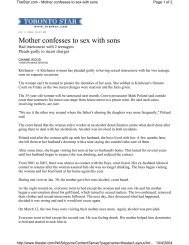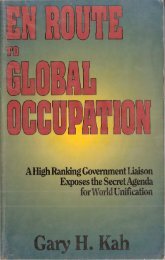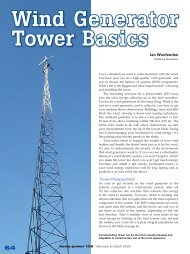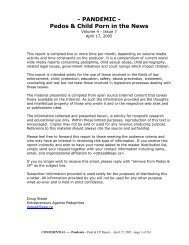G. Edward Griffin - The Fearful Master - PDF Archive
G. Edward Griffin - The Fearful Master - PDF Archive
G. Edward Griffin - The Fearful Master - PDF Archive
You also want an ePaper? Increase the reach of your titles
YUMPU automatically turns print PDFs into web optimized ePapers that Google loves.
Even though he had personally participated in and helped to execute one of the most<br />
perfidious schemes ever directed against freedom-loving human beings, he apparently did<br />
not realize what he had done, or so he says.<br />
<strong>The</strong> important point, however, is that O'Brien speaks with authority. He was there.<br />
Obviously, a great deal of what he has to say must be taken with a large grain of salt. But<br />
what he reveals about both himself and the organization to which he is so strongly<br />
committed is, if anything, overly charitable. If O'Brien's words are incriminating in spite of<br />
his pro-United Nations bias, then they are certainly worthy of our serious consideration.<br />
For example, consider O'Brien's description of a meeting of the "Congo club," which is the<br />
nickname for his group of top United Nations planners and advisors on the Congo. Among<br />
others, Dag Hammarskjold and Ralph Bunche (representing the U.S.) were present.<br />
<strong>The</strong> Afro-Asian thesis--that the secession of Katanga would have to be<br />
ended, and that the United Nations would have to help actively in<br />
ending it--was tacitly accepted round the table, and not less by the<br />
Americans than by the others. What mattered most to all of them was<br />
that the United Nations should emerge successfully from its Congo<br />
ordeal, and it was clearly seen that a condition of success was the<br />
speedy removal of the props of Mr. Tshombe's regime, thereby making<br />
possible the restoration of the unity of the Congo. <strong>The</strong> continued<br />
existence of the independent state of Katanga was recognized as a<br />
threat to the existence of the United Nations and therefore even those<br />
who, from the standpoint of their personal political opinions, might have<br />
been favourably enough disposed to what Mr. Tshombe represented,<br />
were convinced of the necessity of strong measures. . . . This was an<br />
example of the victory of an international loyalty over personal<br />
predilections. If neutral men are simply men who put the interests of the<br />
United Nations first, then Hammarskjold and all around him at that table<br />
were neutral men. 13<br />
Ignoring for the moment the enlightening definition of UN neutrality, one should really go<br />
back and reread this incredible statement several times to fully comprehend the extent of<br />
the calm premeditation behind the policy of deliberate deception initiated by these high<br />
officials. For months they had been issuing public statements and personal assurances<br />
that the United Nations not only had no intentions of interfering in the internal matter of<br />
Katanga's secession, but that it had no legal right to do so under the terms of its own<br />
Charter. Yet, at the very outset O'Brien, Hammarskjold, Bunche and a host of other top<br />
United Nations planners sat around a conference table and quietly worked out plans for<br />
removing "the props of Mr. Tshombe's regime."<br />
Elsewhere in his book O'Brien provided more illumination on the United Nations' total lack<br />
of integrity and respect for honesty in its pretended aims when he wrote that Mr. M. Khiary<br />
(head of UN civil operations in the Congo)<br />
. . . had little patience with legalistic detail, with paragraph this of<br />
resolution that, or what the Secretary-General had said in August 1960.<br />
He had no patience at all with the theory, often asserted in the early<br />
days by Hammarskjold, and never explicitly abandoned, that the United<br />
Nations must refrain from interfering in the internal affairs of the Congo.<br />
"What are we here for then?" he would ask. "Il faut faire de la politique!"


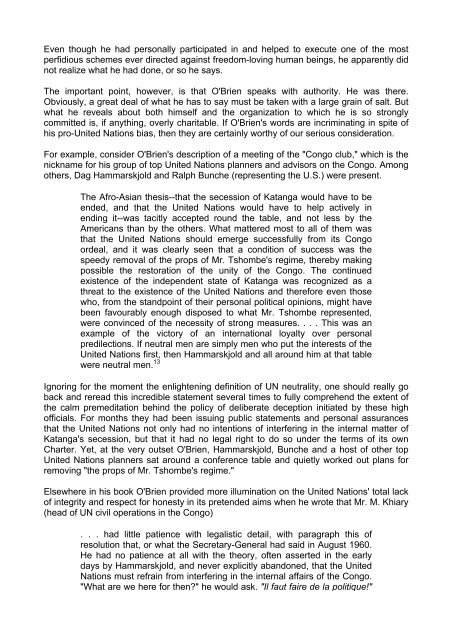
![Robert T McQuaid [rtmq@stn.net] Sent: Friday, October 29, 2004 12 ...](https://img.yumpu.com/51070071/1/190x245/robert-t-mcquaid-rtmqstnnet-sent-friday-october-29-2004-12-.jpg?quality=85)



